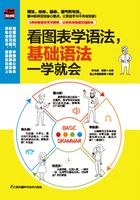
9 介词——非同小可的小词
介词是一种虚词,通常置于名词、代词或相当于名词的结构之前,不能单独作句子成分,只表示其后的名词、代词与句中其他成分之间的关系。

(1)介词的分类
按照不同的标准可以将介词分成不同的种类,按其表示的含义和构成方式可以分为以下几类:

(2)介词的位置
通常情况下,介词放在其宾语(名词)之前,并与宾语紧紧相连,但有时候介词与其宾语相隔较远,出现在宾语之后。
①疑问句中介词的位置
介词在疑问句中的位置有以下四种情况:

②定语从句中介词的位置
在正式文体中,都将介词放在其宾语(关系代词)之前;在非正式问题中,经常将介词置于从句句末,且作宾语的关系代词通常省略。例如:
The scenic spot at which we took photos is a five-star scenic spot.
The scenic spot we took photos at is a five-star scenic spot.我们拍照的那个景点是个五星级景点。
My villa, for which I paid US$60,000, is now worth US$100,000.
My villa, which I paid US$60,000 for, is now worth US$100,000.我花了六万美元买的别墅现在值十万美元。
③介词宾语放在句首加强语气
在非正式的口语中,若要加强语气,常将此宾语移到句首而介词则保留在后面原来的位置。例如:
Your remaining here I have no objection to.你留在这我不反对。
What you said I don't agree with.我不同意你所说的话。
Dance I am interested in, but music I am not.我喜欢舞蹈,但是不喜欢音乐。
(3)介词的用法
①介词的省略
一般情况下介词不可以省略,但在一些特殊表达或固定搭配中,有些介词是可以省略的,主要有以下几种情况:


②介词与其他词类的搭配
介词可以跟在名词、动词、形容词后面,与它们一起构成各种搭配。

③几组介词的用法比较
a.时间介词in, at, on

※温馨提示:
表示上午、下午或晚上的单词前一般用介词in;但具体到某一天的上午、下午或晚上时应用介词on。
on Sunday morning星期日早上
on the night of August 12八月十二日晚上
on a sunny afternoon of last week上周一个阳光明媚的下午
b.时间介词during, in
during和in都表示一段时间。但是during更加强调时间的延续,因此它可以表示在某段时间内自始至终的状态,谓语动词一般是延续性的。当我们要准确说出某动作发生的时间时,就要用in。
I woke up three times during/in the night.夜里我醒了三次。
The accident happened in the morning.事故发生在早晨。(不用during)
c.时间介词for, since
for和since引导的时间状语都有延续之意,但着眼点不同,用法也有所不同。
● “for + 时间段”表示“延续……之久”,其着眼点是现在,即表示延续到现在的一段时间(与现在完成时连用),或表示一段已经终结了的时间(与过去时连用),或表示将要延续的一段时间(与将来时连用):
They lived in America for three years.他们在美国住过三年。
They will stay in America for three years.他们将在美国住三年。
They have lived in America for three years.他们在美国已经住了三年。
● “since + 时间点”表示“自从(过去某时)以来”,其着眼点是过去某时,即表示自过去某时延续至今的一段时间,常与现在完成时连用。
He has lived here since 2000.从2000年开始,他就住在这里。
She hasn't written home since Christmas.从圣诞节到现在她还没给家里写过信。
d.时间介词in, after
in和after可以表示“……(时间)之后”。
● “in + 时间段”用于将来时。
I'll arrive at the railway station in two hours.我两小时后到达火车站。
● “after + 时间段”用于过去时。after后接一个具体的时间点时,也可用于将来时。
She came back after 4 hours.四个小时之后她回来了。
She'll be back after 4 o'clock in the afternoon.她下午四点以后回来。
e.时间介词by, before
by表示“不迟于某时”,包括某时在内;before则表示“在某时之前”,不包括某时在内。试比较:
I will finish the work by Friday.星期五之前我会完成这项工作。
When angry, count ten before you speak; if very angry, count a hundred.
生气的时候数到十再说话;如果非常生气的话,就数到一百。
f.地点介词on, in, above, over

g.方位介词between, among
● between表示某人或某物“在(另两人或两物)之间”,常用“between A and B”或“between + 复数名词”结构。
Happiness is a way station between too much and too little.
幸福是介于太多和太少之间的一站。
It is often hard to distinguish between the hard knocks in life and those of opportunity.在生活中常常很难区分逆境和机会。
● among表示某人或某物“在(三者或更多者)之间;在……内部”,其所在范围内的人或事物通常视为一个整体。
Shakespeare's plays are among the great classics of English literature.莎士比亚的戏剧是英国文学中伟大的经典。
All men are endowed by their Creator with certain unalienable rights among which are life, liberty and the pursuit of happiness.造物者赋予每个人某些不可剥夺的权利,它们是生存的权利、自由的权利和追求幸福的权利。
h.方位介词through, across, past, over
● through和across都表示“穿过”。through表示从内部穿过,与in有关。
Rain poured through the roof.雨水从屋顶灌了下来。
● across表示从表面上通过,与on有关。
He swam across the river.他游过了河。
● past表示从旁经过。
They drove past a big supermarket.他们开车经过了一个大型超市。
● over表示从上方跨过。
The plane flew over the Great Wall.那架飞机从长城上空飞过。
i.方位介词in front of, in the front of
两者都表示“在……的前面”, in front of指在某物外部的前面,in the front of指在某物内部的前面。
We planted some trees in front of our house.我们在房子前面栽了一些树。
He sat in the front of the bus.他坐在车的前面。
j. except, besides, except for
● except表示“除……之外(其他的都)”,其后的宾语是被排除在外的。
Tom does everything around the house except cooking.汤姆做了家里所有的家务,除了做饭。(汤姆所做的家务不包括做饭)
● besides表示“除……之外(其他的也)”,其后的宾语是被包括在内的。
There were three other people at the meeting besides Mr. Brown.会议上除了布朗先生还有其他三个人。(参加会议的包括布朗宁先生)
● except for后被排除的内容与主语往往不是同一类的。
All the buildings are excellent except for their locations.这些建筑除了地理位置以外其他都很好。(这些建筑的地理位置不好)
k.表示工具、手段、材料的with, by, in
表示工具、手段、材料时,with, by, in都表示“用”。
● with多指用具体的工具。
The English student learns to eat with chopsticks.这个英国学生学者用筷子吃饭。
● by指使用的方法。
He made a living by running a small restaurant.他靠经营一个小饭店谋生。
● in则指使用的语言和工具的具体类型。
Don't write these numbers in pencil; write them in ink.这些数字别用铅笔写,用墨水笔写。